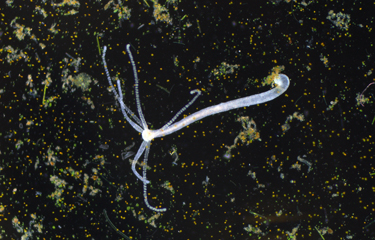Mowi Scotland is exploring whether hydrozoans, also known as “micro-jellyfish,” are responsible for certain gill health challenges seen in farmed salmon.
Speaking ahead of the International Gill Heath Conference, being held virtually on 26 and 27 October, 2021, Mowi Regional Health Manager Lucy Fry said that daily monitoring of plankton and hydrozoans pointed toward a range of jellyfish species as a possible cause for some previously unexplained gill problems.
Hydrozoans cannot be detected by the naked eye, but microscopic analysis is helping Mowi to map out their presence at its sites. Around 10 percent of Mowi Scotland’s salmon farms were found to have experienced significant blooms of different hydrozoan species since monitoring began 12 months ago.
According to Mowi, hydrozoans can be more problematic than larger jellyfish species, with stinging cells potentially causing damage to gill tissue. Their stings can create significant gill damage and potentially complicate other concomitant gill infections such as amoebic gill disease, and because of their size, there is also a risk of them causing significant internal damage to fish by getting into their digestive systems, Mowi said.
“We are constantly looking for new ways to enhance fish health and, with our improved system for monitoring micro jellyfish, we are now able to begin to track patterns and trends that will indicate the need for further preventative measures to protect fish stocks against hydrozoans,” Fry said. “By continuing this research and sharing knowledge, we hope to develop a better cross-sector understanding of how fish are affected by micro-jellyfish species and identify whether they do contribute to AGD and other unexplained gill health issues, as we currently suspect.”
The International Gill Heath Conference is being delivered by the Sustainable Aquaculture Innovation Centre in Scotland with support from the Norwegian Seafood Research Fund.
Photo courtesy of D. Kucharski K. Kucharska/Shutterstock







